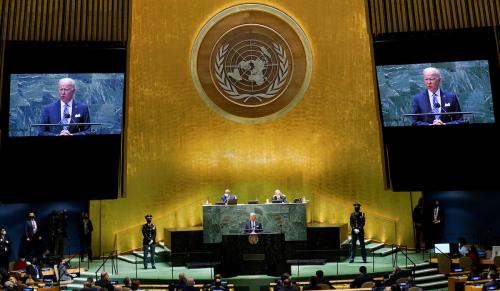How should we assess America’s responses to the 2008 financial crisis? Perhaps the most natural way to answer is by turning to the merits of the government’s policy responses. Given the imminent crisis, did our government’s leaders in the White House, Treasury Department, Federal Reserve, and FDIC do the best they could with the available tools to minimize the damage of the crisis? How did Congress handle itself, both in terms of providing additional tools and passing structural reforms that strengthened a regulatory system whose weaknesses had been exposed? Did the people shaping the government’s responses correctly apprehend the underlying cause(s) of the calamity? A lively debate over these momentous questions has now begun and will rage on for many decades to come.
But there is another way to answer these questions, which until now has received little sustained attention. Namely: by asking whether specific choices led to the widespread public rejection of the crisis responses. In other words, how and why, in responding to the financial crisis, did the government end up with a political legitimation crisis as well?
For those who harshly judge the economic merits of the government’s crisis responses, this political perspective may seem to have little to add. For them, an economic failure has become a political failure; America’s slow and unevenly shared recovery is the fruit of poorly-handled, bank-friendly crisis management and the cause of widespread political illegitimacy. Simple enough. But, to my mind, overly simplistic.
Many of the crisis responses that critics confidently predicted would cost taxpayers hundreds of billions of dollars turned out to be pushes or small gains. Anxious prophecies of interminable government entwinement in private enterprise have, happily, been revealed as overheated. Evaluated in light of our economic peers America’s recovery, slow though it has been, looks fairly good. And so policy failure does not really look like a plausible explanation for the poor reputation of the crisis responses. What is? I begin to provide answers in my new book, To the Edge: Legality, Legitimacy, and the Responses to the 2008 Financial Crisis, on sale today.
As the title suggests, in trying to identify culprits for the crisis responses’ poor reception, one of my main suspects was their strained legal justifications. Crudely speaking, the government did a great deal that was barely legal and took at least a few actions that can fairly be described as outside the law. As I observed the crisis responses in real time, the willingness to make ad hoc decisions without clear legal underpinnings offended me as a believer in the importance of the rule of law, and I thought that these legal defects might be a major source of public criticism.
To the Edge largely acquits legal irregularities, however—at least as a cause of widespread dissatisfaction with the government’s responses. Most people have the attitude concisely expressed by Senator Chuck Schumer (D-NY), who early on in the crisis brushed aside any concerns about transgressions against legal limitations by saying, “To look into the abyss of imminent financial collapse or the potential and do nothing is irresponsible.” Teetering on the brink of financial disaster creates room for political leaders to maneuver, even if doing so takes them to the edge of their previously understood legal boundaries or beyond. This pattern has deep roots in U.S. history and is a close parallel to cases of military emergency. Rule of law purists are outliers in their concerns, with the broader public basing their judgments on entirely different considerations.
Without a doubt, first among these considerations is policy efficacy, though it is not always very easily observed, especially by people whose lives are not centrally occupied by policy. When we think about why the Treasury’s legally dubious rescue of money market funds using the Exchange Stabilization Fund never became a major scandal, we can start and mostly stop our analysis with the fact that it cost taxpayers nothing and achieved its major aims. Likewise with the Fed’s Commercial Paper Funding Facility or the FDIC’s Temporary Liquidity Guarantee Program. At least by the most obvious metrics, these programs were resounding successes, and so the people who knew enough to see their legal issues were not inclined to make a fuss.
Where evidence of programmatic success is harder to come by, however, the public’s judgments will largely rest on issues of trust—and particularly on whether people believe the government is pursuing the public good in the broadest sense, rather of the cirhan unfairly finding opportunities to enrich insiders. To put it mildly, trust was in short supply when the financial crisis hit in 2008; of all of the executives faced with a dire crisis in American history, President Bush may have been the worst positioned to sell a sometimes distasteful set of crisis responses to a skeptical public.
That left the task of legitimation to the crisis fighters at the head of various executive branch institutions: Hank Paulson and then Timothy Geithner at Treasury, and Ben Bernanke at the Fed. While Bernanke’s scholarly reputation and demeanor served him well as he sought to educate congressional leaders, none of these figures came from the world of politics and generally it showed. They felt, understandably, that they were making significant personal sacrifices as they pursued the public service of saving the world, and that the public should extend them some measure of trust. The public, understandably, wondered if the life experiences of this bunch of elites left them indifferent to normal people’s troubles. Choices made to deprioritize mortgage modifications and foreclosure relief, while focusing on rescuing giant financial firms, only made this impression worse.
The crisis fighters mostly shrugged off arguments that they were unfairly privileging the interests of the already-privileged. Showing a mindset common to all of the crisis fighters, in his memoir Geithner explained that the farsighted and thus truly public-spirited thing to do is ignore political pressures and maintain a laser-like focus on stopping the spread of financial crisis. Worry exclusively about policy efficacy and let legitimation take care of itself.
But worries of unfairness, whether well-founded or not, cannot simply be held at arm’s length if crisis fighters are sufficiently pure of heart and clear of mind. Ultimately such concerns have profound costs, even in the short run, as distrust is transmuted into political posturing expressed in the form of angry, hastily formulated constraints on the policymakers. The very unpredictability of such responses-to-responses make it hard for the crisis fighters to chart a certain course, which in the context of financial crisis means it is hard for them to achieve policy success in the first place.
This dynamic played out most clearly with the belated attempt to launch a public-private asset buying program under TARP. The convoluted PPIP infuriated observers who worried it was a giveaway to Wall Street, which in turn caused Congress to snap into action to modify its terms. That aggressiveness took the shine off the supposedly great investment opportunity for private firms, who mostly stayed away and thus reduced the program to a shadow of its architects’ ambitions.
Failing to cultivate legitimacy, then, has immediate consequences: it can cause policy failure that in turn further damages legitimacy. In the extreme case, this could create a kind of political economic death spiral for a country attempting to fend off a financial crisis. Thankfully, nothing of the sort happened in recent years; with some combination of skill and good fortune, our crisis fighters muddled through.
To the Edge argues that there were many choices made, including by Congress, to ensure that we steered clear of political disaster. Where trust is in short supply, devices to ensure ex post accountability can act as partial substitutes. Special crisis oversight bodies and muckraking media, often in conjunction with each other, scrutinized the crisis responses, and having these watchdogs on the job provided important assurances that government favoritism and self-dealing would be prevented or at least punished. These watchdogs’ tactics were often objectionable, but I argue that their presence was nevertheless an important source of legitimacy for the crisis responses.
On these themes and many more, To the Edge provides a political and legal perspective on the financial crisis responses that has been sorely lacking. Check out the book itself, and stay tuned to FixGov for updates on related writing.



Commentary
Why America’s responses to the financial crisis brought us to the edge of political crisis
April 21, 2015